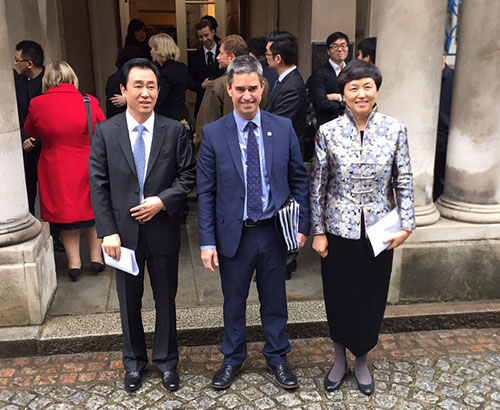China-UK research deal for sustainable cities
Day-two of Chinese President Xi Jinping's Official State Visit saw the signing of a £200 million collaborative research deal. UK building science centre BRE, China’s top university Tsinghua and one of the country’s largest property development companies Evergrande signed the agreement in London with the aim of helping China build sustainable low-carbon cities.
Designed to support China’s sustainable urbanization and national green building programme, the projects will receive more than £3m in funding from the UK’s Engineering and Physical Sciences Research Council (EPSRC); a figure matched by the National Natural Science Foundation of China (NSFC).
With the overriding objective of reducing the carbon emissions of existing technologies, the projects will also include R&D on new green materials, the reduction of energy demand, and post-occupancy evaluation studies, all with a focus on how to improve the energy efficiency of cities.
The four projects are:
- Low carbon transitions of fleet operations in metropolitan sites (Newcastle University, Imperial College London Southeast University).
- City-wide analysis to propel cities towards resource efficiency and better wellbeing (University of Southampton, Xi’an University of Architecture and Technology).
- The ‘total performance’ of low-carbon buildings in China and the UK (University College London, Tsinghua University).
- Low-carbon climate-responsive heating and cooling of cities (University of Cambridge, University of Reading and Chongqing University).
Chief Executive of BRE Dr. Peter Bonfield said, "Our Chinese partners have the ability to affect real change in the built environment. They currently deliver buildings, homes and communities on an unprecedented scale quickly and cost effectively. They will take the learning from this collaborative programme and deliver a sustainable built environment without compromising on cost and speed – something that hasn’t yet been done anywhere else in the world. We look forward to playing our part in what will be a transformative research partnership."
Minister of State for Universities and Science Jo Johnson said, "China is one of our most important international partners and at the last China-UK trade summit our Governments agreed to boost collaboration on science and technology. This project is a direct result of that commitment, and I look forward to seeing it progress."
Professor Che Chengwei, deputy director general, department of engineering and material Sciences, NSFC said, "This latest programme…will build substantially stronger links between Chinese and UK research communities in relevant areas. It will also brighten the future bilateral collaboration between both countries."
Featured articles and news
Skills plan for engineering and building services
Comprehensive industry report highlights persistent skills challenges across the sector.
Choosing the right design team for a D&B Contract
An architect explains the nature and needs of working in this procurement route .
Statement from the Interim Chief Construction Advisor
Thouria Istephan; Architect and inquiry panel member outlines ongoing work, priorities and next steps.
The 2025 draft NPPF in brief with indicative responses
Local verses National and suitable verses sustainable: Consultation open for just over one week.
Increased vigilance on VAT Domestic Reverse Charge
HMRC bearing down with increasing force on construction consultant says.
Call for greater recognition of professional standards
Chartered bodies representing more than 1.5 million individuals have written to the UK Government.
Cutting carbon, cost and risk in estate management
Lessons from Cardiff Met’s “Halve the Half” initiative.
Inspiring the next generation to fulfil an electrified future
Technical Manager at ECA on the importance of engagement between industry and education.
Repairing historic stone and slate roofs
The need for a code of practice and technical advice note.
Environmental compliance; a checklist for 2026
Legislative changes, policy shifts, phased rollouts, and compliance updates to be aware of.
UKCW London to tackle sector’s most pressing issues
AI and skills development, ecology and the environment, policy and planning and more.
Managing building safety risks
Across an existing residential portfolio; a client's perspective.
ECA support for Gate Safe’s Safe School Gates Campaign.
Core construction skills explained
Preparing for a career in construction.
Retrofitting for resilience with the Leicester Resilience Hub
Community-serving facilities, enhanced as support and essential services for climate-related disruptions.
Some of the articles relating to water, here to browse. Any missing?
Recognisable Gothic characters, designed to dramatically spout water away from buildings.
A case study and a warning to would-be developers
Creating four dwellings... after half a century of doing this job, why, oh why, is it so difficult?
Reform of the fire engineering profession
Fire Engineers Advisory Panel: Authoritative Statement, reactions and next steps.
Restoration and renewal of the Palace of Westminster
A complex project of cultural significance from full decant to EMI, opportunities and a potential a way forward.
Apprenticeships and the responsibility we share
Perspectives from the CIOB President as National Apprentice Week comes to a close.



























